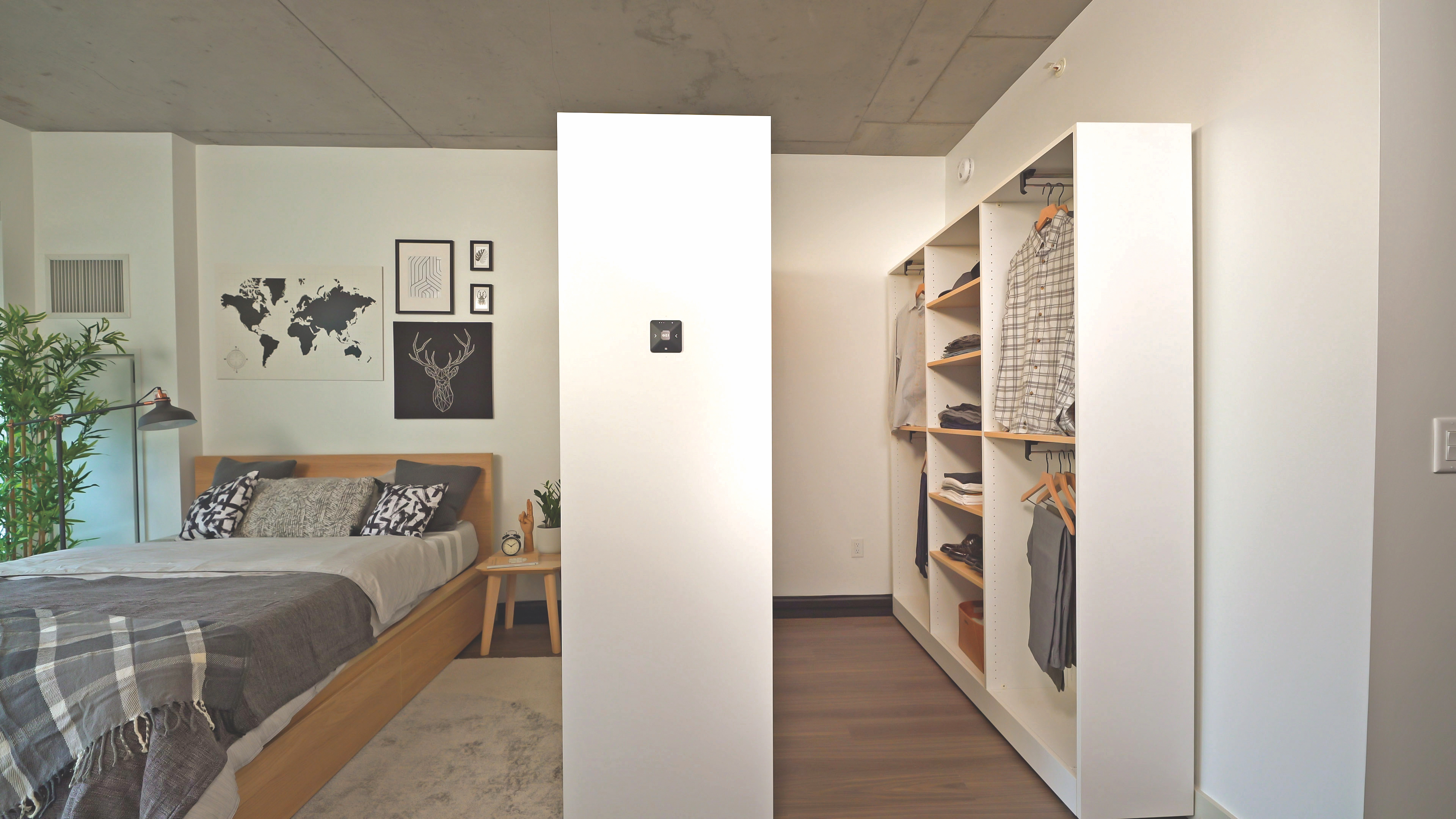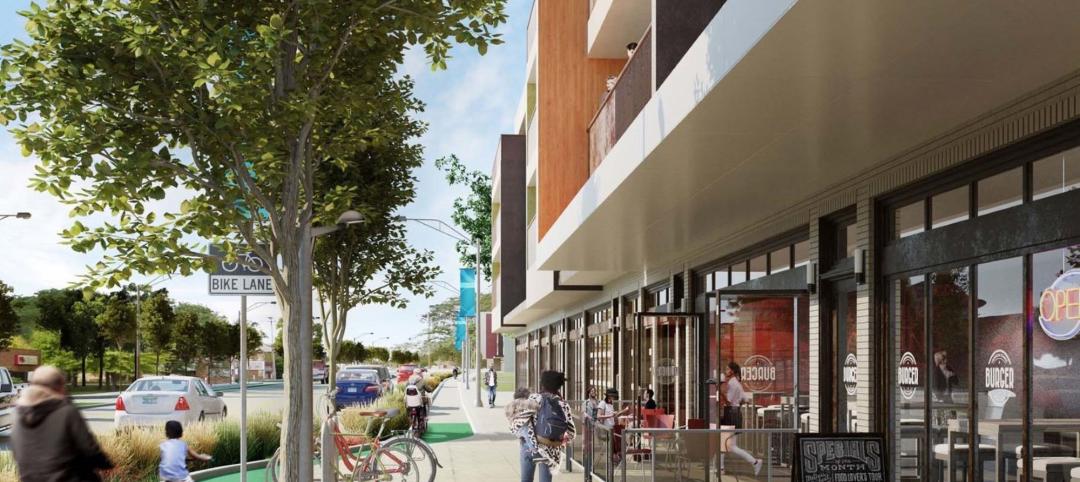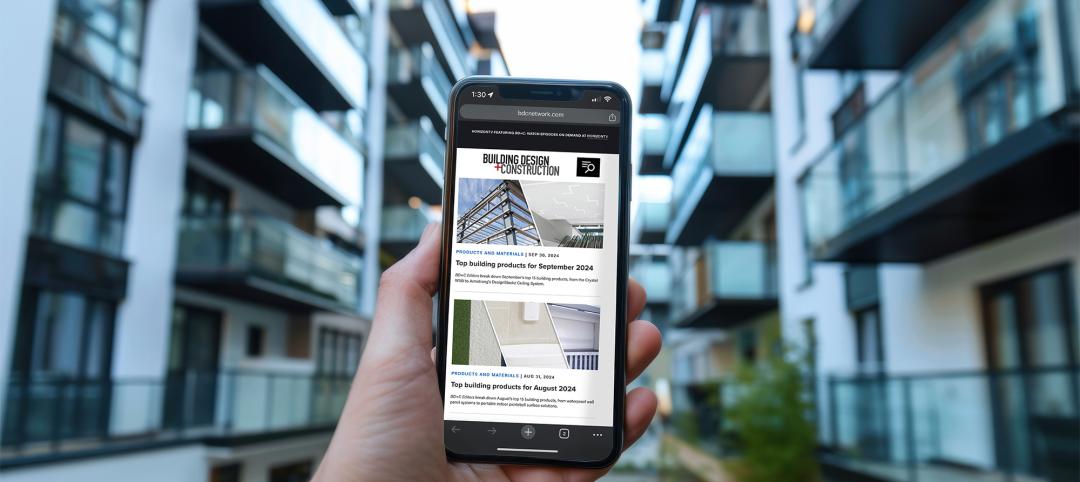As soon as an architect friend showed him a video of the Ori system, Matt Branagh knew it was just what he was looking for. The fourth-generation Owner/CEO of Branagh Development, Lafayette, Calif., saw that Ori could make his studio apartments feel like junior one-bedroom units—perfect, he said, for the “huge wave of people” coming to Oakland from San Francisco to get more space at lower rental cost in a first-class building.
He leased five Studio Suites and purchased eight Pocket Closets for Maya, his firm’s 47-unit apartment building in Oakland, which opened in March. He’s bundling a $275/month premium into the leases for units with a Studio Suite and $95/month for those with a Pocket Closet.
Branagh said tenant adoption for the Pocket Closet was “really strong.” “People get it,” he said. “It’s a price point that they’re willing to pay for, and it’s unique—their friends don’t have it.” He said some prospective tenants were “a little intimidated” working the robotic keyboard at first, but “once they did it a couple of times, they loved it.”
He said Ori turned his floor plans around in 3-4 days and suggested several options. The manufacturer flew in two technicians from Boston to install the systems. They had to do a work-around for the Pocket Closets because the nonmoving section of the two-part system would have bumped into the apartments’ mini-splits. Even so, “the installation was quicker than expected,” just a few days, he said. Branagh has ordered six more.
For Nova Quincy, a 171-unit mixed-use rental community in Quincy, Mass., 10 miles south of Boston, Jonathan Miller, Vice President of LBC Boston, has ordered 40 Studio Suites. “Our prospective tenants are young professionals looking for value outside Boston but close to transit in a lively downtown center,” said Miller. The MBTA Red Line stop is a seven-minute walk.
Nova Quincy will open in September, but already there’s been “a ton of interest” in the Ori system from prospective tenants “looking for something innovative.”
Studio Suites will be installed in 10 studio apartments and 30 micro-units (330–400 sf). “One of the primary benefits of Ori is your usable square footage is much greater”—about 100–150 sf more, he has calculated—“than what you’re paying for.” LBC Boston will include a $200–250 monthly rental premium for what they’re calling “Ori Smart” Studios.
SEE ALSO: Robotic interiors: How to make a studio apartment feel as big as a one-bedroom unit
Miller said he wants to see how the leasing goes for the Ori-outfitted units, but so far he’s “definitely bullish” on using Studio Suites in future projects in Quincy, Allston, and Brighton, where LBC Boston has permitting for 1,500 apartments.
Related Stories
MFPRO+ New Projects | Oct 30, 2024
BIG’s One High Line finally reaches completion in New York City’s West Chelsea neighborhood
One High Line, a luxury residential project spanning a full city block in New York’s West Chelsea neighborhood, reached completion this summer following years of delays related to investor lawsuits.
MFPRO+ New Projects | Oct 30, 2024
Luxury waterfront tower in Brooklyn features East River and Manhattan skyline views
Leasing recently began for The Dupont, a 41-story luxury rental property along the Brooklyn, N.Y., waterfront. Located within the 22-acre Greenpoint Landing, where it overlooks the newly constructed Newtown Barge Park, the high-rise features East River and Manhattan skyline views along with 20,000 sf of indoor and outdoor communal space.
Multifamily Housing | Oct 28, 2024
A case for mid-rise: How multifamily housing can reshape our cities
Often referred to as “five-over-ones,” the mid-rise apartment type is typically comprised of five stories of apartments on top of a concrete “podium” of ground-floor retail. The main criticism of the “five-over-one” is that they are often too predictable.
Adaptive Reuse | Oct 22, 2024
Adaptive reuse project transforms 1840s-era mill building into rental housing
A recently opened multifamily property in Lawrence, Mass., is an adaptive reuse of an 1840s-era mill building. Stone Mill Lofts is one of the first all-electric mixed-income multifamily properties in Massachusetts. The all-electric building meets ambitious modern energy codes and stringent National Park Service historic preservation guidelines.
MFPRO+ News | Oct 22, 2024
Project financing tempers robust demand for multifamily housing
AEC Giants with multifamily practices report that the sector has been struggling over the past year, despite the high demand for housing, especially affordable products.
Products and Materials | Oct 17, 2024
5 multifamily tech products for your next project
Multifamily housing and technological upgrades go hand-in-hand. From the rise in electric vehicle charging needs to the sophistication of smart home accessories, tech products are abound in the multifamily space.
Codes and Standards | Oct 16, 2024
North Carolina’s code policies likely worsened damage caused by Hurricane Helene
The North Carolina Legislature’s rejection of building code updates likely worsened the damage caused by Hurricane Helene, code experts say. Over the past 15 years, lawmakers rejected limits on construction on steep slopes, which might have reduced the number of homes destroyed by landslides.
MFPRO+ News | Oct 16, 2024
One-third of young adults say hurricanes like Helene and Milton will impact where they choose to live
Nearly one-third of U.S. residents between 18 and 34 years old say they are reconsidering where they want to move after seeing the damage wrought by Hurricane Helene, according to a Redfin report. About 15% of those over age 35 echoed their younger cohort’s sentiment.
Student Housing | Oct 9, 2024
University of Maryland begins work on $148 million graduate student housing development
The University of Maryland, in partnership with Campus Apartments and Mosaic Development Partners, has broken ground on a $148.75 million graduate student housing project on the university’s flagship College Park campus. The project will add 741 beds in 465 fully furnished apartments.
MFPRO+ News | Oct 9, 2024
San Francisco unveils guidelines to streamline office-to-residential conversions
The San Francisco Department of Building Inspection announced a series of new building code guidelines clarifying adaptive reuse code provisions and exceptions for converting office-to-residential buildings. Developed in response to the Commercial to Residential Adaptive Reuse program established in July 2023, the guidelines aim to increase the viability of converting underutilized office buildings into housing by reducing regulatory barriers in specific zoning districts downtown.

















